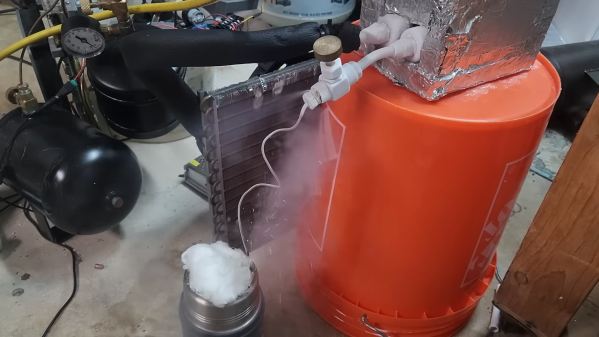[Hyperspace Pirate] wants to make his own dry ice, but he wants it to be really, really cheap. So naturally, his first stop is… the beach?
That’s right, the beach, because that’s where to find the buckets of free seashells that he turned into dry ice. Readers may recall previous efforts at DIY dry ice, which used baking soda and vinegar as a feedstock. We’d have thought those were pretty cheap materials for making carbon dioxide gas, but not cheap enough for [Hyperspace Pirate], as the dry ice he succeeded in making from them came out to almost ten bucks a pound. The low yield of the process probably had more to do with the high unit cost, in truth, so cheaper feedstocks and improved yield would attack the problem from both ends.
With a supply of zero-cost calcium carbonate from the beach and a homemade ZVS-powered induction heater tube furnace at the ready, [Hyperspace Pirate] was ready to make quicklime and capture the CO2 liberated in the process. That proved to be a little more difficult than planned since the reaction needed not just heat but a partial vacuum to drive the CO2 off. An oil-free vacuum pump helped, yielding a little CO2, but eventually he knuckled under and just doused the shells in vinegar. This had the fun side effect of creating calcium acetate, which when distilled not only corrodes the copper still plumbing but also makes a lousy but still flammable grade of acetone. Once enough CO2 was stored in a couple of beach balls, the process of cooling and condensing it into dry ice was pretty much the same as the previous method, except for taking advantage of the Joule-Thomson cryocooler he built a while back.
The result is a hundred or so grams of dry ice snow, which isn’t great but still shows promise. [Hyperspace Pirate] feels like the key to improving this process is more heat to really drive the calcination reaction. Might we suggest a DIY tube furnace for that job?
Continue reading “Dry Ice From Seashells, The Hard (But Cheap) Way”











